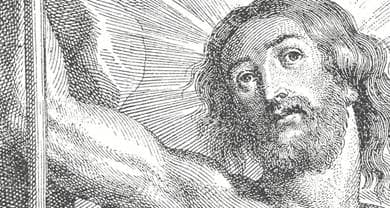- Trending:
- Forgiveness
- |
- Resurrection
- |
- Joy
- |
- Feminism
- |
- Afterlife

RELIGION LIBRARY
Anglican/Episcopalian
Human Nature and the Purpose of Existence
Human nature is best understood through the lens of human purpose, of why God created humanity. Excerpts from the American Book of Common Prayer (BCP) can be taken together to show an Anglican understanding of the purpose of human existence. Because of the great variety within Anglican thought, this description should not be taken as representative of the views of all Anglicans; it is, however, recognizably Anglican.
The first excerpt states that God made each person for God's self. The second is from the opening of the worship service, praying that God would enable the worshippers to "perfectly love" God and to "worthily magnify" God's holy name. The third is from a post-Communion prayer in which both priest and parishioners ask that God grant them "strength and courage to love and serve you with gladness and singleness of heart." Thus, because one was made for God one is to live for God. Living for God means loving God perfectly. It also means magnifying God's name and serving God. To magnify God's name and to serve God means to worship God and to love and serve one's neighbors. God's name is magnified by worship and service, and God is served by one's worship and by love toward one's neighbors.
Another way of expressing these same points is through Anglicanism's great emphasis on unity. The purpose of human existence is unity with God and unity with one another. For this reason it is prayed that those who partake of the Lord's Supper "may become one body and one spirit, a living sacrifice in Christ, to the praise of your Name."
Turning to human nature, as with other beliefs, the reader must bear in mind that there is tremendous diversity of beliefs within Anglicanism regarding human nature. The following is best thought of as a conventional baseline drawing upon the Thirty-nine Articles, rather than a representative description of the beliefs of all Anglicans. Thus, using traditional categories, there are three states of human nature that must be considered: first, human nature as originally created; second, human nature after the fall; and third, human nature after regeneration. The purpose of humanity does not change with the changes in human nature.
Like other Christians, Anglicans traditionally have believed that the original humans were created good, in God's image and after God's likeness. The human will was good, meaning it was aligned with God's own will. There was no struggle to please God, for by its very nature--and accordingly also in its actions and intentions--humanity was good and pleasing to God. Humanity was at one with God and each other.
The first humans were also endowed with the freedom to choose whether or not to obey God. They chose to exalt their own desires over God's command, to distrust God's word. They freely rebelled against their Creator, and thereby fell away from their natural relationship, their natural unity, with God. The "fall" refers to this rupturing of relationship with God, and the resulting corruption of the goodness of creation. As a result of the fall, human nature is no longer good, but corrupt. This corrupted nature is known as "fallen nature" and the corruption is "original sin." As Article 9 of the Thirty-nine Articles points out, original sin does not consist of a free choice to follow Adam's sin, but of "the fault and corruption of the Nature of every" person. This corruption "naturally is engendered of the offspring of Adam."
The characteristics of this corrupted nature are also described in Article 9. Each person is naturally inclined to evil, enslaved to sin. Said differently, each person's will and desires are always contrary to God's will and desires. God's will is for unity, for worship of God and love of one another, but the human will is for none of these. Consequently, every person deserves "God's wrath and damnation." As the American BCP succinctly describes, by the fall "we became subject to evil and death."
Another aspect of the condition of humanity is described in Article 10. This says that a person cannot turn to faith and to calling upon God by the person's "own natural strength and good works." No person has the power to do anything that is "pleasant and acceptable to God." Thus, in summation, the characteristics of fallen nature are an inclination toward evil (no worship or love), an inability to turn to God or to please God (no unity), and a status before God as condemned.
There is an exception in Article 10 to the statement that no one can please God. By God's grace through Christ repairing the human will and working with the person whose will has been repaired, such a person can please God. This repairing of the will is known as "regeneration." As a regenerate person one is, by God's grace, returned to unity with God and capable both of worshipping God and of loving one's neighbor. But a regenerate person is not a person who no longer sins, or is no longer inclined toward evil. As Article 9 states, the "infection of nature" remains in the regenerate person. The principal difference between the unregenerate fallen person and the regenerate (but still fallen) person is the status of each before God. Whereas the unregenerate person stands condemned, "there is no condemnation for them that believe and are baptized." Perfection of human nature--and therefore perfect worship, love, and unity--only comes in the afterlife.
As was mentioned above, Anglican views of human nature are extremely diverse. Some hold a more Arminian perspective, allowing for a universal prevenient grace, that is, grace that enables any person to turn to God. Others downplay, reinterpret, or reject the fall narrative, focusing on humanity as the bearer of God's image, or perhaps taking an evolutionary perspective of humanity's spiritual, as well as physical, development and potential.
Study Questions:
1. What does the Book of Common Prayer reveal about the purpose of existence?
2. Describe the relationship between unity and the Anglican purpose of existence.
3. Why should human nature be considered in three states? What does each include?
4. What does the Thirty-nine Articles reveal about the fall of human nature?
5. How does the Anglican understanding of creation relate to the Anglican understanding of salvation?










